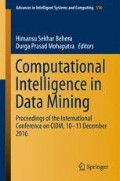Abstract
Recently, increase or decrease in blood pressure level is one of the main problems for human all over the world which causes heart attack, Brain stroke, and many other diseases. There are many reasons for blood pressure and is increasing day-by-day and controlling blood pressure is one of the difficult tasks for every patient. For that patients take different kinds of medicines according to doctors suggestion. But, effects of these medicines gradually decrease at the time passes by. In this work we propose a treatment named as MusMed which is the combination of music therapy and medicine which helps to control blood pressure of human body. We used Indian classical raga by instrumental guitar as a music therapy and olmesartan molecule as a medicine. The results indicate that the combination of music therapy and medicine works well as compared to only medicine. Our results are validated through mercury sphygmomanometer.
Access this chapter
Tax calculation will be finalised at checkout
Purchases are for personal use only
References
Cidad, P., Novens, L., Garabito, M., Batlle, M., Dantas, A.P., Heras, M., Lpez-Lpez, J.R., Prez-Garca, M.T., Roqu, M.: K+ Channels Expression in Hypertension After Arterial Injury, and Effect of Selective Kv1.3 Blockade with PAP-1 on Intimal Hyperplasia Formation. Cardiovascular Drugs and Therapy, 28(6), 501–511 (2014).
Wang, Y., Xie, F., Kong, M.C., Lee, L.H., Ng. H.J., Ko, Y.: Cost-effectiveness of Dabigatran and Rivaroxaban Compared with Warfarin for Stroke Prevention in Patients with Atrial Fibrillation. Cardiovascular Drugs and Therapy, 28(6), 575–585 (2014).
Basciftci, F., Eldem, A.: Using reduced rule base with Expert System for the diagnosis of disease in hypertension. Int. federation for medical and biological engineering, 51(12), 1287–1293 (2013).
Diaz, K.M., Tanner, R.M., Falzon, L., Levitan, E.B., Reynolds, K., Shimbo, D., Muntner, P.: Visit-to-visit variability of blood pressure and cardiovascular disease and all-cause mortality: a systematic review and meta-analysis. Hypertension, 64(5) 965–982 (2014).
http://www.medicalnewstoday.com/releases/91285.php, Last Accessed 25 June, 2016.
Konecni, Vladimir, J.: Does music induce emotion? A theoretical and methodological analysis. Psychology of Aesthetics, Creativity, and the Arts, 2(2), 115–129 (2008).
Chanda, M.L. and Levitin, D.J.: The neurochemistry of music. Trends in Cognitive Sciences, 17(4), 179–193 (2013).
Harrison, L., Loui, P.: Thrills, chills, frissons, and skin orgasms: toward an integrative model of transcendent psychophysiological experiences in music. Frontiers in Psychology, 5(790), 1–6 (2014).
Sloboda, J.A.: Music structure and emotional response: some empirical findings. Psychol. Music, 19, 110–20 (1991).
Blood, A.J., Zatorre, R.J.: Intensely pleasurable responses to music correlate with activity in brain regions implicated in reward and emotion. Proc. Natl. Acad. Sci, 98, 11818–11823 (2001).
Brown, S., Martinez, M.J., and Parsons, L.M.: Passive music listening spontaneously engages limbic and paralimbic systems. Neuroreport., 15, 2033–2037 (2004).
Jeffries, K.J., Fritz, J.B., Braun, A.R.: Words in melody: an h(2)15o pet study of brain activation during singing and speaking. NeuroReport, 14, 749–754 (2003).
Koelsch, S. Towards a neural basis of music-evoked emotions. Trends Cogn. Sci, 14, 131–137 (2010).
Dehcheshmeh, F.S., Rafiei, H.: Complementary and alternative therapies to relieve labor pain: A comparative study between music therapy and Hoku point ice massage. Complementary Therapies in Clinical Practice, 21, 229–232 (2015).
McKinney, C.H., Antoni, M.H., Kumar, M., Tims, F.C., McCabe, P.M.: Effects of guided imagery and music (GIM) therapy on mood and cortisol in healthy adults. Health Psychol, 16(4), 390–400 (1997).
McKinney, C.H. The effect of selected classical music and spontaneous imagery on plasma beta-endorphin. J. Behav. Med, 20, 85–99 (1997).
Khalfa, S. et al. Effects of relaxing music on salivary cortisol level after psychological stress. Ann. N. Y. Acad. Sci, 999, 374–376 (2003).
Wallston, K.A.: The validity of the multidimensional health locus of control scales. J. Health Psychol, 10, 623–631 (2005).
http://www.cancerresearchuk.org/about-cancer/cancers-in-general/treatment/complementary-alternative/therapies/music-therapy, last accessed 29 June, 2016.
http://www.dailymail.co.uk/health/index.html, last accessed 29 June, 2016.
Bernardi, L., Sleight, P., Bandinelli, G., Cencetti, S., Fattorini, L., Wdowczyc-Szulc, J., Lagi, A.: Effect of rosary prayer and yoga mantras on autonomic cardiovascular rhythms: Comparative study. British Medical Journal, 325, 1446–1449 (2005).
Author information
Authors and Affiliations
Corresponding author
Editor information
Editors and Affiliations
Rights and permissions
Copyright information
© 2017 Springer Nature Singapore Pte Ltd.
About this paper
Cite this paper
Ramasamy, V., Sarkar, J., Debnath, R., Sarkar, J.L., Panigrahi, C.R., Pati, B. (2017). MusMed: Balancing Blood Pressure Using Music Therapy and ARBs. In: Behera, H., Mohapatra, D. (eds) Computational Intelligence in Data Mining. Advances in Intelligent Systems and Computing, vol 556. Springer, Singapore. https://doi.org/10.1007/978-981-10-3874-7_43
Download citation
DOI: https://doi.org/10.1007/978-981-10-3874-7_43
Published:
Publisher Name: Springer, Singapore
Print ISBN: 978-981-10-3873-0
Online ISBN: 978-981-10-3874-7
eBook Packages: EngineeringEngineering (R0)

